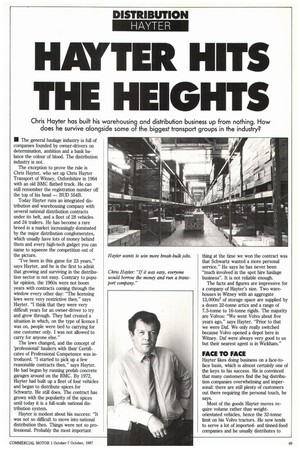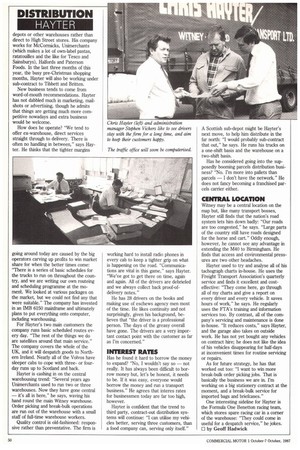HAYTER HITS THE HEIGHTS
Page 51

Page 52

If you've noticed an error in this article please click here to report it so we can fix it.
Chris Hayter has built his warehousing and distribution business up from nothing. How does he survive alongside some of the biggest transport groups in the industry?
• The general haulage industry is full of companies founded by owner-drivers on determination, ambition and a bank balance the colour of blood. The distribution industry is not.
The exception to prove the rule is Chris Hayter, who set up Chris Hayter Transport of Witney, Oxfordshire in 1964 with an old BMC flatbed truck. He can still remember the registration number off the top of his head — BUD 554B.
Today Hayter runs an integrated distribution and warehousing company with several national distribution contracts under its belt, and a fleet of 28 vehicles and 24 trailers. He has become a rare breed in a market increasingly dominated by the major distribution conglomerates, which usually have lots of money behind them and every high-tech gadget you can name to squeeze the competition out of the picture.
"I've been in this game for 23 years," says Hayter, and he is the first to admit that growing and surviving in the distribution sector is not easy. Contrary to popular opinion, the 1960s were not boom years with contracts coming through the window every other day: "The licensing laws were very restrictive then," says Hayter. "I think that they were very difficult years for an owner-driver to try and grow through. They had created a situation in which, on the type of licence I was on, people were tied to carrying for one customer only. I was not allowed to carry for anyone else."
The laws changed, and the concept of 'professional' hauliers with their Certificates of Professional Competence was introduced. "I started to pick up a few reasonable contracts then," says Hayter. He had begun by running prefab concrete garages around on the BMC. By 1972, Hayter had built up a fleet of four vehicles and began to distribute spices for Schwartz. He still does. The contract has grown with the popularity of the spices until today it is a full-scale national distribution system.
Hayter is modest about his success: "It was not so difficult to move into national distribution then. Things were not so professional. Probably the most important thing at the time we won the contract was that Schwartz wanted a more personal service." He says he has never been "much involved in the spot hire haulage business". It is not reliable enough.
The facts and figures are impressive for a company of Hayter's size. Two warehouses in Witney with an aggregate 13,000m2 of storage space are supplied by a dozen 32-tonne artics and a range of 7.5-tonne to 16-tonne tigids. The majority are Volvos: "We went Volvo about five years ago," says Hayter. "Prior to that we were Daf. We only really switched because Volvo opened a depot here in Witney. Daf were always very good to us but their nearest agent is in Wickham."
FACE TO FACE
Hayter likes doing business on a face-toface basis, which is almost certainly one of the keys to his success. He is convinced that many customers find the big distribution companies overwhelming and impersonal: there are still plenty of customers out there requiring the personal touch, he says.
Most of the goods Hayter moves require volume rather than weight orientated vehicles, hence the 32-tonne limit on his Volvo tractors. He now tends to serve a lot of importedand tinned-food companies and he usually distributes to depots or other warehouses rather than direct to High Street stores. His company works for McConnicks, Unimerchants (which makes a lot of own-label pastas, ratatouilles and the like for Tesco and Sainsburys), Halfords and Paterson Foods. In the last three months of this year, the busy pre-Christmas shopping months, Hayter will also be working under sub-contract to Tibbett and Britten.
New business tends to come from word-of-mouth recommendations. Hayter has not dabbled much in marketing, mailshots or advertising, though he admits that things are getting much more competitive nowadays and extra business would be welcome.
How does he operate? "We tend to offer ex-warehouse, direct services straight through to delivery. There is often no handling in between," says Hayter. He thinks that the tighter margins going around today are caused by the big operators carving up profits to win market share for when the better times come: "There is a series of basic schedules for the trucks to run on throughout the country, and we are writing our own routeing and scheduling programme at the moment We looked at various packages on the market, but we could not find any that were suitable." The company has invested in an IMB 6150 mainframe and ultimately plans to put everything onto computer, including warehousing.
For Hayter's two main customers the company runs basic scheduled routes every day. "The rest of the things we do are satellites around that main service." The company covers the whole of the UK, and it will despatch goods to Northern Ireland. Nearly all of the Volvos have sleeper cabs to cope with threeor fourday runs up to Scotland and back.
Hayter is cashing in on the central warehousing trend: "Several years ago Unimerchants used to run two or three warehouses. Now they have gone central — it's all in here," he says, waving his hand round the main Witney warehouse. Order picking and break-bulk operations are rim out of the warehouse with a small staff of full-time warehouse workers.
Quality control is old-fashioned: responsive rather than preventative. The firm is working hard to install radio phones in every cab to keep a tighter grip on what is happening on the road. "Communications are vital in this game," says Hayter. "We've got to get there on time, again and again. All of the drivers are debriefed and we always collect back proof-ofdelivery notes."
He has 28 drivers on the books and making use of eschews agency men most of the time. He likes continuity and not surprisingly, given his background, believes that "the driver is a professional person. The days of the greasy overall have gone. The drivers are a very important contact point with the customer as far as I'm concerned."
INTEREST RATES
Has he found it hard to borrow the money to expand? "No, I wouldn't say so — not really. It has always been difficult to borrow money but, let's be honest, it needs to be. If it was easy, everyone would borrow the money and run a transport business." He agrees that interes rates for businessmen today are far too high, however.
Hayter is confident that the trend to third party, contract-out distribution systems will continue: "I can utilise my vehicles better, serving three customers, than a food company can, serving only itself." A Scottish sub-depot might be Hayter's next move, to help him distribute in the far north: "I would probably sub-contract that out," he says. He runs his trucks on a one-shift basis and the warehouse on a two-shift basis.
Has he considered going into the supposedly booming parcels distribution business? "No. I'm more into pallets than parcels — I don't have the network." He does not fancy becoming a franchised parcels carrier either.
CENTRAL LOCATION
Witney may be a central location on the map but, like many transport bosses, Hayter still finds that the nation's road system lets him down badly: "Our roads are too congested," he says. "Large parts of the country still have roads designed for the horse and cart" Oddly enough, however, he cannot see any advantage in extending the M40 to Birmingham. He finds that access and environmental pressures are two other headaches.
Hayter used to try and analyse all of his tachograph charts in-house. He uses the Freight Transport Association's quarterly service and finds it excellent and costeffective: "They come here, go through all of my charts and give a report on every driver and every vehicle. It saves hours of work," he says. He regularly uses the FTA's training and information services too. By contrast, all of the company's servicing and maintenance is done in-house. "It reduces costs," says Hayter, and the garage also takes on outside work. He has not yet bought any vehicles on contract hire; he does not like the idea of his vehicles disappearing for half-days at inconvenient times for routine servicing or repairs.
As for future strategy, he has that worked out too: "I want to win more break-bulk order picking jobs. That is basically the business we are in. I'm working on a big stationery contract at the moment, and a break-bulk service for imported bags and briefcases."
One interesting sideline for Hayter is the Formula One Benetton racing team, which stores spare racing car in a corner of the warehouse: "They could come in useful for a despatch service," he jokes. El by Geoff Hadwick












































































































